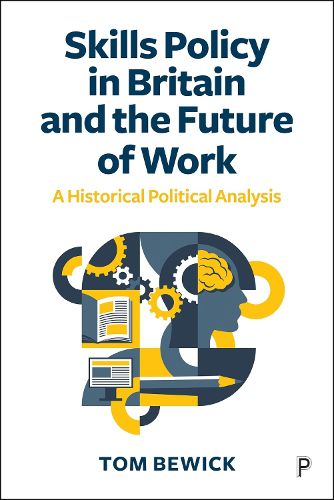Readings Newsletter
Become a Readings Member to make your shopping experience even easier.
Sign in or sign up for free!
You’re not far away from qualifying for FREE standard shipping within Australia
You’ve qualified for FREE standard shipping within Australia
The cart is loading…






What role did Winston Churchill play in excluding comprehensive schooling from the 1944 Education Act? What was the failed promise of technical education in the post-war period? Why did Margaret Thatcher manipulate government training programmes before the 1987 General Election? And what was the fallout of Tony Blair's government over lifelong learning?
In this book, Tom Bewick examines the evolution of UK skills policy from the 1881 Royal Commission on Technical Instruction to the present day, revealing how shifting political ideologies have shaped workforce development. He applies a chronological, historical-policy-analysis framework to explain the 'four training states' of skills policy and workforce development between the 1940s and the 2020s:
The Interventionist State (1944-1979)
Laissez-faire State (1980-1987)
Localism and Devolved States (1988-2010)
The Technocratic State (2011 onwards)
Traversing time periods to uncover political and economic driving forces, this book challenges conventional thinking and offers insights into how future skills policies can be more effective.
$9.00 standard shipping within Australia
FREE standard shipping within Australia for orders over $100.00
Express & International shipping calculated at checkout
What role did Winston Churchill play in excluding comprehensive schooling from the 1944 Education Act? What was the failed promise of technical education in the post-war period? Why did Margaret Thatcher manipulate government training programmes before the 1987 General Election? And what was the fallout of Tony Blair's government over lifelong learning?
In this book, Tom Bewick examines the evolution of UK skills policy from the 1881 Royal Commission on Technical Instruction to the present day, revealing how shifting political ideologies have shaped workforce development. He applies a chronological, historical-policy-analysis framework to explain the 'four training states' of skills policy and workforce development between the 1940s and the 2020s:
The Interventionist State (1944-1979)
Laissez-faire State (1980-1987)
Localism and Devolved States (1988-2010)
The Technocratic State (2011 onwards)
Traversing time periods to uncover political and economic driving forces, this book challenges conventional thinking and offers insights into how future skills policies can be more effective.